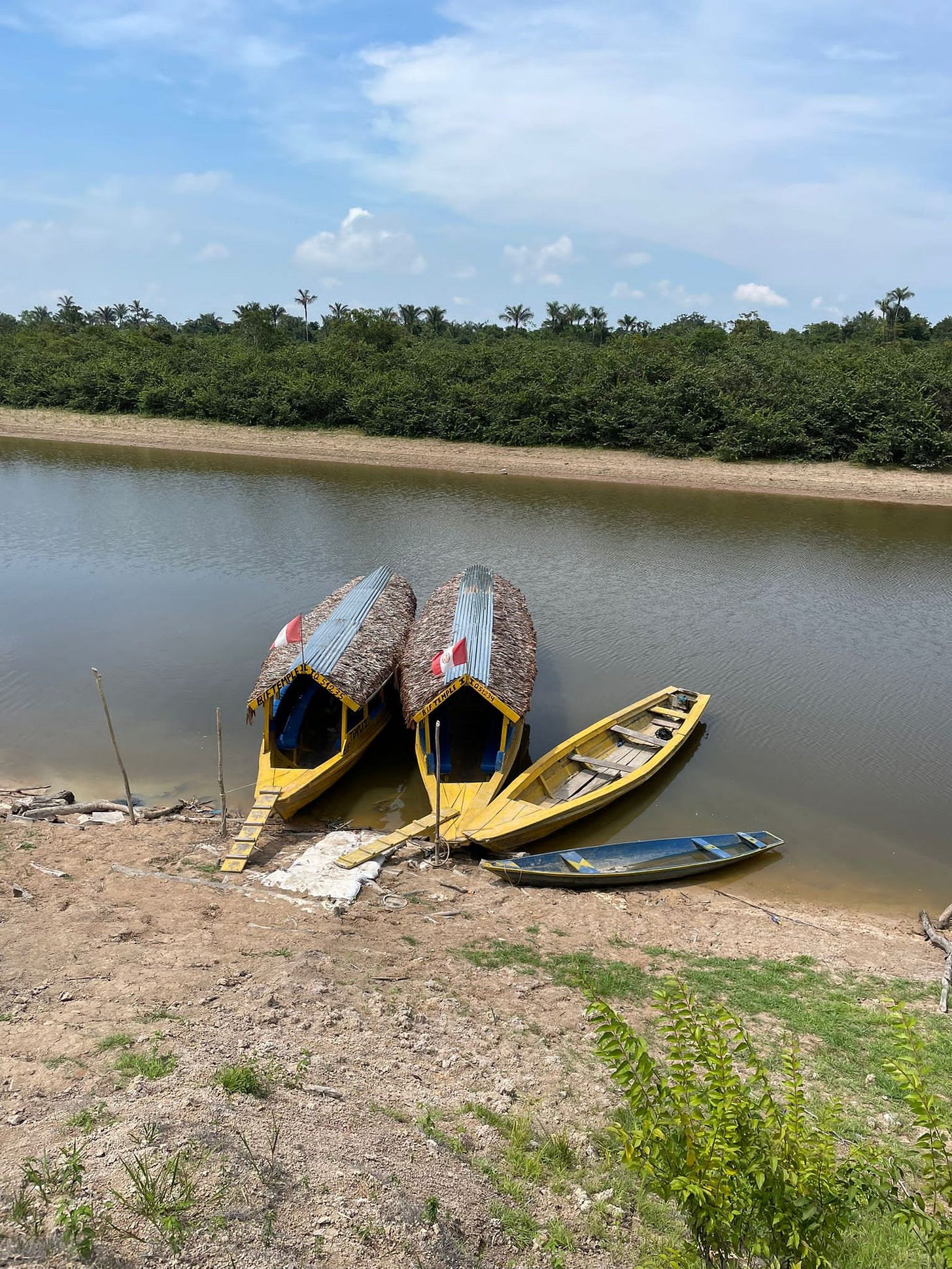Alignment needs space
How long can you go doing the least possible?
I’ve just re-surfaced from retreat. For the past two weeks I’ve been deep in the Peruvian Amazon jungle with 23 other seekers. No phone, no electricity, and on a very stripped back diet of no salt, no sugar, no spices, no dairy, no caffeine. None of my usual joys.
It took a one hour bus ride through the noisy city of Iquitos, followed by a small wooden river boat down a tributary of the Amazon, and finally a 45 minute hike through the sticky humidity of the jungle to arrive at our retreat centre.
Once we arrived, there was no turning back.
Outside of the organised activities, we had long stretches of downtime. With no access to technology and only each other and a small library of donated books from previous guests to entertain us, there was very little to do. Without any connection at all to the outside world, it only took a few days away from the usual stimuli of my day to day to start noticing what was left behind once everything was stripped back to just the essentials.
I’ve never journaled so many times a day in my life. I finally read Tara Brach’s ‘Radical Acceptance’ cover to cover, as well as multiple other books I’d probably have never picked up otherwise. For the first time in years I found myself lingering over poetry. I ate many of the meals silently, delighting in any flavour I could squeeze out of the food.
I got used to not having sugar, and as the kind of person who usually checks the dessert menu first, I was surprised by how little I craved it after dinner.
In the hottest part of the day, I napped, completely free of any guilt that I should be being productive.
Hours passed swinging in my hammock looking out into the jungle, watching the birds startle the leaves of the trees as they flew from branch to branch, thinking about nothing and everything at the same time.
I started mentally keeping track of all the different kinds of butterflies I was seeing, and learning to distinguish between the sound of the birds depending what time of day it was.
With no electricity, once the sun set around 6.30pm and we’d finished dinner by 7pm, the only thing we could do in the blue black of the night was surrender to the darkness. We had small kerosene lamps that were bright enough only to stumble our way to the bathroom, but not much else. With all the mysterious sounds of the animals around us, it wasn’t the kind of place you could just sit out and stare at the stars, so most of the nights we were huddled in our wooden huts, falling asleep by 8pm. When things got scary, I found comfort in the friend I went with and as the days passed our connection deepened and settled into a new level of sisterhood. In the mornings as the sky was brightening I naturally felt compelled to move and stretch out my body and sit in open ended meditation.
Slowly, threads of ideas and insights I’d been thinking about connected together and with the time to notice and investigate them, I was able to refine them down into things I could action when I got home.
This is the opposite end of the spectrum of the kind of travel I’ve been doing so far this year. Apart from a short weekend retreat I did earlier this year, most of my summer was spent travelling around Europe with friends and family with the vibes turned up to max. The mood board was Janelle Monae’s Age of Pleasure.
Until a couple of years ago, the way I thought about vacation and time away was most often on the maximalist side of the spectrum like many people. How can I fit in the most sights, experiences, bucket list items, people to meet in the least amount of days? The retreat reminded me that just as we feast, there’s also a time to famine. There’s beauty in the maximalist, but also in the minimalist.
What if as we think about our downtime or leisure time, we allow some space to think about how long we can go doing the least?
Can I take a step back from my life the way it currently is and pay attention to what falls away and what stays standing? What cravings linger? What desires become clearer? What feels unbearable? Why? What behaviour patterns become obvious? What values become louder?
It might be two weeks, or it could just be a few days or even a few hours or minutes.
The length of time isn’t what matters. What does is that alignment needs space.
Journal prompts:
As we enter the last few months of the year, how can you create an opportunity to retreat?
What is a habit that you can experiment letting go of for a period of time to notice what changes when you don’t have it to rely on? For e.g. giving up coffee for a couple of weeks?
How can you create more space in your daily or weekly routine? For e.g. can you integrate a no-meeting day, or no-meeting morning? Or no phone Sundays?




